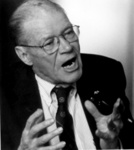the fog of war
27 Oct 2005 I finally watched The Fog of War tonight. It’s a very interesting documentary, to say the least.
I finally watched The Fog of War tonight. It’s a very interesting documentary, to say the least.
McNamara, in this interview, is much better at asking tough questions of himself than really providing any answers. For example:
“In order to win a war, is a nation justified in killing 100,000 civilians in one night?” “Would it be moral to not burn to death 100,000 Japanese civilians, but instead to lose hundreds of thousands of American lives in an invasion of Japan?”
…
LeMay said, “If we lost the war, we’d all have been prosecuted as war criminals”. And I think he’s right. He, and I’d say I, were behaving as war criminals. LeMay recognised that what he was doing would be thought immoral if his side had lost. But what makes it immoral if you lose, and not immoral if you win?
Good questions, but not many answers to be found in this interview. Considering the context of, well, McNamara’s career and reputation, this documentary paints a pretty flattering picture of McNamara. The side of McNamara reflected in conversations with Johnson contrast interestingly with the public McNamara – the former representing someone who resented Johnson’s escalation and disapproved of the war, and the latter being utterly complicit in furthering it and deceiving the public nonetheless. But the amount of context from both sides is not enough to be conclusive. As someone that did not live through this period, I’m left wondering where McNamara’s loyalties really lie. (You get the impression through this documentary that perhaps he doesn’t really know either.)
He comes across as genuinely concerned about his moral failings and responsibility, but sometimes dismissive and unapologetic and other times near the brink of tears. He at least frankly takes responsibility for the deaths at his hands and expresses remorse, which I guess in some ways makes him the anti-Kissinger.
When asked who bears the responsibility for the Vietnam war he answered “The President” without flinching, and also made several comments about doing his job and serving his country – and perhaps this is how he justifies his time in the Johnston administration spinning lies about the (lack of) progress in the Vietnam War.
In this way, he sortof reminded me of Colin Powell, with the bullshit “proud soldier” tripe.
Anyways, it’s a great documentary about a pretty interesting man.